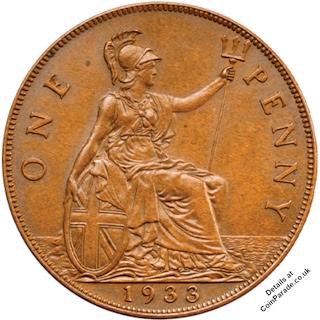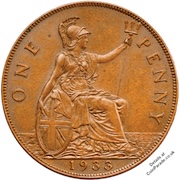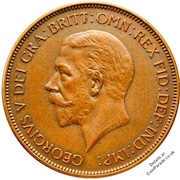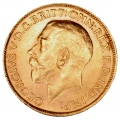
 The 1933 Penny - The Legend of the 1933 Penny: the Real Story
The 1933 Penny - The Legend of the 1933 Penny: the Real StoryThe 1933 Penny is one of the most talked about British coins of all time. Does it exist? Is there maybe only one in circulation? No-one knows for sure, but here is the real story behind the legendary coin.
Back in 1933 there were already tens of millions of pennies in circulation, both Edwardian and Victorian. The Royal Mint decided that they didn't need to add any new coins so decided not to mint any coins for circulation. But there was a secondary requirement to mint a few.
The convention at the time was to bury a complete set of coins under the foundation of new building of high importance. So six or seven coins were minted (there are no precise records), three went under buildings, and three are at the British Museum, the Royal Mint Museum, and the University of London. If a seventh was minted then its whereabouts are unknown. It may even have leaked into circulation, leading to much media speculation over the years.
The buildings were the Church of St Cross in Middleton (near Leeds), St Mary’s Church in Leeds, and the Bloomsbury buildings of the University of London. In 1970, the coins beneath Church of St Cross in Middleton were dug up and stolen. The Bishop of Ripon, probably worried that the coins under St Mary’s Church in Leeds would fall to a similar fate, had the coins removed and sold.
The 1933 story didn't end there. The George V pennies had a problem with 'ghosting' so the Royal Mint brought in French artist Andre Lavillier to engrave some new dies as a pattern for the next coins, with only minor design changes but different designers initials. There were four 1933 Pattern pennies minted, although the designs were never used for circulation. In 2016, auctioneers A H Baldwin and Sons sold one for £86,400 (£72,000 plus the buyer’s premium), doubling estimates, making it the most expensive bronze coin ever sold.
The 1933 Penny itself has on the obverse the George V 'small head' portrait (as it has a smaller portrait compared to previous coins), designed by Australian sculptor Bertram MacKennal. The Reverse shows Britannia seated, with Trident and shield.
 SCBC 4055.
SCBC 4055.Note that there are many counterfeit 1933 pennies around!
Image credit: The Royal Mint
Mintage: Rare
Minted at The Royal Mint
More information (monarch, year, mint, country, category) can be found below coin listings.
Below are some coins currently being offered on eBay. As an eBay Partner, We may be compensated if you make a purchase.
List items on:
List items on:
George V (1910-1936)
 George V was King of the United Kingdom and the British Dominions, and Emperor of India, from 6 May 1910 until his death in 1936 and was King during World War 1. George was the second son of Albert Edward, Prince of Wales (later King Edward VII), and grandson of Queen Victoria. After his death he was succeeded by his eldest son, Edward VIII.
George V was King of the United Kingdom and the British Dominions, and Emperor of India, from 6 May 1910 until his death in 1936 and was King during World War 1. George was the second son of Albert Edward, Prince of Wales (later King Edward VII), and grandson of Queen Victoria. After his death he was succeeded by his eldest son, Edward VIII. In 1919-20, the Silver price rose dramatically so .925 silver coins began to made in 0.500 siver. Gold Sovereigns were produced in large quantities early in George's reign - over 30 million in 1911 and again in 1912, although there was no bullion sovereigns issued 1918-1924 (Commonwealth mints did continue mintage).
Category: Penny
The Penny is one of the most famous British coins. The coin itself has been around since 600AD and at various times has been struck in silver, copper and bronze. Originally split into halfpennies and farthing, it is now itself the least denomination coin currently in circulation. Made from copper (actually copper plated steel). Originally there were 12 pennies in one shilling and 240 pennies in £1; since decimalisation in 1971 there are 100 new pence in one pound.
Composition: Early pennies were Silver, then Copper, Bronze and Copper coated steel.
Which Mint: The Royal Mint
The Royal Mint is the designated place for the UK to mint coins. It dates back well over 1000 years and is a Government-owned company. Formed in the reign of Alfred the Great about the year 886, during the period 1279-1812 it was generally referred to as The Tower Mint as it was housed at the Tower of London. The Master of The Royal Mint has included famous figures such as Sir Isaac Newton.
Since 2010 it has operated as Royal Mint Ltd, a company owned by HM Treasury, under an exclusive contract to supply all coinage for the UK although it also produces medals and coins for other countries. It is currently located at Llantrisant, Wales.
Country of Origin: United Kingdom
The United Kingdom (UK) is the Union of England, Scotland, Wales and Northern Ireland. It is often refered to as Great Britain (GBR). It has a long, rich history. The orignal coinage was Pounds, Shillings and Pence but since decimalisation on 15 February 1971, it is £1 = 100p, that is One Pound = 100 pence. The coinage of the UK is also a long history, the Royal Mint being established as long ago as 886AD when coins were hammered. Today there is perhaps 30 billion coins in circulation, and many (numismatic) collectors coins and sets are issued frequently in gold, silver and other metals.








